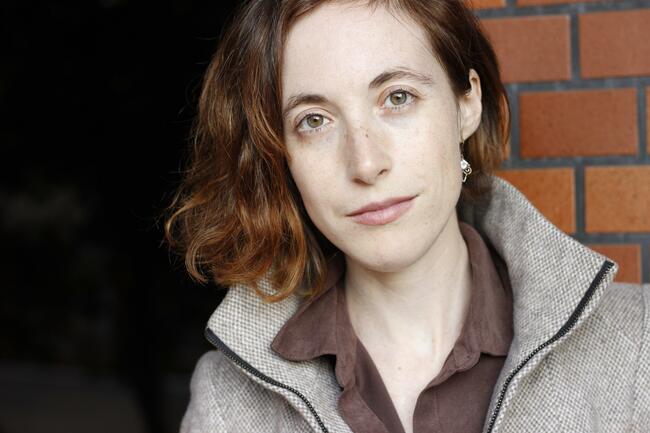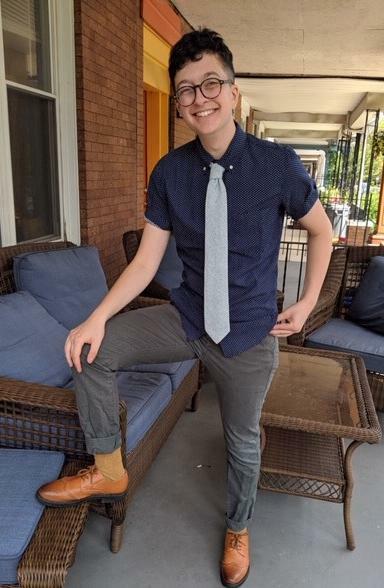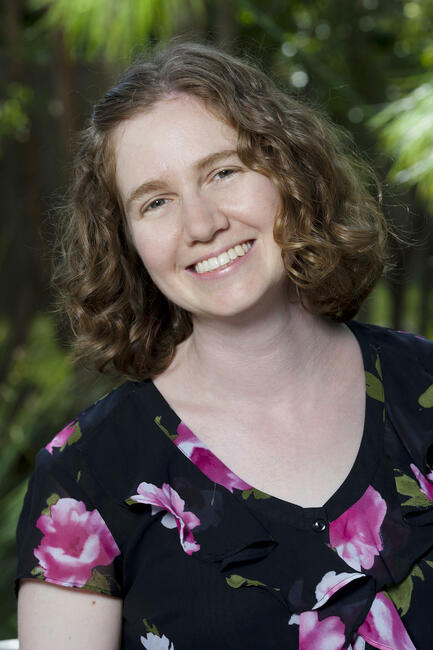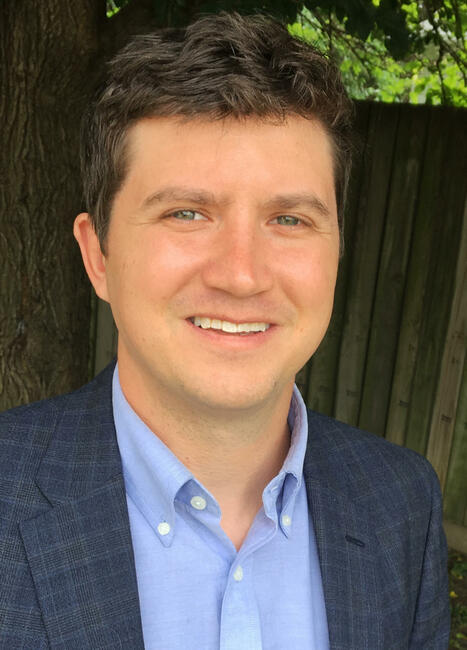Alumni Takeaways
Alumni Reflect on How Their Experiences with the Yiddish Book Center have Continued to Impact Their Lives and Work

Lee Conell (TENT: Creative Writing '16)
My experience in the Yiddish Book Center’s Tent: Creative Writing program impacted my work in ways I didn’t expect. I knew my week there would be interesting and hoped it’d be inspiring, but I didn’t predict that it would also introduce me to a community of such smart, thoughtful, and funny fellow writers, many of whom were interested in discussing a sense of their own Jewishness in ways that felt (and still feel) so expansive and necessary to me. I also didn’t realize that the program would, in such a short period of time, manage to form a space where I could think about and discuss the ways Yiddish literature played into matters of social and economic justice, into the history of progressivism, into all sorts of concerns I was beginning to explore more openly in my own fiction—so I definitely think my experience at the Yiddish Book Center helped inform my novel, which at that time I was still trying to better understand and shape. The program deepened my experience in all the ways: In writing ways, in reading ways, in language ways, and in walking-around-as-a-human-being ways.
Lee Conell's novel The Party Upstairs is forthcoming this July with Penguin Press. She's also the author of a story collection, Subcortical, which was awarded The Story Prize’s Spotlight Award. Her short fiction has received the Chicago Tribune’s Nelson Algren Award and appears in the Oxford American, Kenyon Review, Glimmer Train, American Short Fiction, and elsewhere. She is a 2020 National Endowment for the Arts Fellow as well as the recipient of creative writing fellowships from the Japan-United States Friendship Commission, the Tennessee Arts Commission, and the Sewanee Writers’ Conference.

Daniel Holtzman (TENT: Creative Writing '18, Wexler Oral History Project Field Fellow '20)
My time studying creative nonfiction at the Tent program has made me a sharper editor and a more thoughtful writer. In my work with New Voices and the Jewish Student Press Service, I sometimes lose sight of the histories of Jewish literature, media, and art that our publication grows from. Through Tent, I was able to delve into essays and stories by a wide range of Jewish authors that have continued to shape my own editing and writing practice. I also took the time to explore the Forverts archives. The breadth and depth of the YBC archives in general remind me that the student work we publish in New Voices is meaningful both in its own right, and for the ways that it captures complex political moments through snapshots from campus.
Now, as a Wexler Oral History Project Field Fellow, I've had the opportunity to connect with another cohort of curious people interested in adding to this vibrant and vital archive. I'm looking forward to continuing my training and starting to conduct interviews in the field. Combined with the learning I did at Tent, I feel equipped to capture, curate, and respond to many different narratives of past and present Jewish life.
Daniel Holtzman is a trans journalist and organizer living in Philadelphia, PA. They are the editor in chief of New Voices, the Jewish and justice-focused magazine by and for college students, and the executive director of the Jewish Student Press Service. Their radio stories have aired on WHYY, WAMU, and WNYC’s Nancy podcast, and they have written for Jewish Currents, Narratively, and Broke in Philly, a collaborative reporting project on economic justice. Daniel attended the Yiddish Book Center’s Tent program during the summer of 2018 and is a 2020 Wexler Oral History Project Field Fellow.

Sarah Bunin Benor (Yiddish Book Center Internship, now Steiner Summer Yiddish Program, '94)
In 1994 I was looking for a paid summer experience, and a poster about Yiddish books caught my eye. Not only would this internship pay, but it would allow me to learn a new language! I didn't realize what a formative and transformative experience that summer would be. I was exposed to a whole world of Yidishkayt that I might never have encountered. I made lifelong friends. And I began on a path that would lead to my career as a scholar of Jewish languages. Now, in my work as teacher, writer, editor, and internet curator, I often use the Yiddish skills and Jewish cultural knowledge I attained between shlepping boxes and sorting books. Inspired by Aaron Lansky salvaging books from dumpsters, I run an initiative to document endangered Jewish languages and share knowledge about Jewish linguistic diversity with the public. I am forever grateful for the foundation I gained 26 years ago. (Has it really been that long?) A sheynem dank.
Sarah Bunin Benor is Professor of Contemporary Jewish Studies at Hebrew Union College–Jewish Institute of Religion, where she teaches mostly masters students in the School of Jewish Nonprofit Management and undergraduates at the University of Southern California. She received her Ph.D. from Stanford University in Linguistics in 2004. She is the author of Becoming Frum: How Newcomers Learn the Language and Culture of Orthodox Judaism (Rutgers University Press, 2012) and Hebrew Infusion: Language and Community at American Jewish Summer Camps (Rutgers University Press, 2020), as well as many articles about Jewish languages, Yiddish, and American Jews. Dr. Benor has received several fellowships and prizes, including the Dorot Fellowship in Israel, the Wexner Graduate Fellowship, and the Sami Rohr Choice Award for Jewish Literature. She is founding co-editor of the Journal of Jewish Languages and co-editor of Languages in Jewish Communities, Past and Present (De Gruyter Mouton, 2018) and We the Resilient: Wisdom for America from Women Born Before Suffrage (Luminare Press, 2017). She founded and directs the HUC-JIR Jewish Language Project, which includes the Jewish Language Website and the Jewish English Lexicon. Her current projects analyze Hebrew use at Jewish supplementary schools and the names Jews give their children and their pets. She lives in Los Angeles with her husband, Mark, and their daughters, Aliza, Dalia, and Ariella.

Josh Parshall (Yiddish Book Center Internship, now Steiner Summer Yiddish Program, '05)
The Yiddish Book Center internship laid the foundation for my ongoing study of Yiddish and Yiddish culture. I continued to take Yiddish courses as a graduate student in folklore and American studies, and my dissertation research focused on Yiddish culture and left-wing politics among Arbeter Ring (Workmen's Circle) members in the American South. The project draws from a variety of Yiddish sources, including published memoirs, handwritten records, and conference journals, and I hope to complete a book manuscript based on the dissertation this year. Additionally, I use Yiddish in my current position as Director of History at the Goldring/Woldenberg Institute of Southern Jewish Life (ISJL), based in Jackson, Mississippi, where I edit the online Encyclopedia of Southern Jewish Communities, conduct public programs on Jewish history in the South, and co-direct our summer internship program in history and heritage. As a supervisor of interns, I also look back on my positive experiences at the Yiddish Book Center to develop an exciting, productive, and educational internship program.
Dr. Josh Parshall has served as the Director of the ISJL History Department since July 2017. This is his second stint at the ISJL, having previously worked as oral historian from 2009 to 2013. His academic interests include American Jewish culture and politics, Yiddish language and culture, and southern studies. He holds a Ph.D. from the Department of American Studies at the University of North Carolina at Chapel Hill. Josh lives in Jackson, Mississippi, with his wife and two kids. His other interests include bicycles, comic books, and disc sports.
